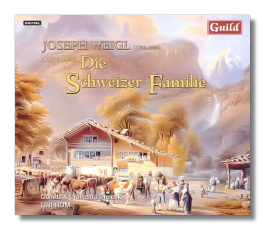
The Internet's Premier Classical Music Source
Related Links
- Weigl Reviews
- Latest Reviews
- More Reviews
-
By Composer
-
Collections
DVD & Blu-ray
Books
Concert Reviews
Articles/Interviews
Software
Audio
Search Amazon
Recommended Links
Site News
 CD Review
CD Review
Joseph Weigl

The Swiss Family
Lyric Opera in 3 Acts
- Tobias Müller-Kopp
- Petri Mikael Pöyhönen
- Stephan Bootz
- Olivia Vermeulen
- Roman Payer
- Robert Maszl
- Antje Hochholdinger
- Michael Hoffmann
Dreieck Chorus and Orchestra/Uri Rom
Guild GMCD7298/99 2CDs 131m DDD
Joseph Weigl (1766-1846) is considered as a link between Mozart and Schubert. He came from a musical family at the Esterházy Court, was trained by Salieri, and Haydn treated him as his godchild.
Apart from playing a leading role in the rehearsals of Mozart's Da Ponte operas, he also became a conductor of the Vienna Court Opera. After composing his first opera in 1783, he went on to write a vast number of works for the theatre. Weigl's oeuvre also includes 18 ballets, 11 masses, 2 oratorios, 22 cantatas and a considerable amount of chamber music.
'The Swiss Family', premièred on 14th March 1809 in Vienna went on to become one of the most famous operas of its time. It was performed almost everywhere between Paris and St. Petersburg, many theatre goers knew almost half of it by heart, and Schubert who had been attending performances of 'The Swiss Family' since he was 15, was heavily influenced by its charm and cohesive structure.
It remained alive for more than a century, then after the Munich production of 1918, it disappeared into oblivion. It was performed again in 2004 after 86 years of unjust neglect. The story is simple yet appealing and Weigl wrote some marvellously delicate melodies to fit in with Ignaz Franz Castelli's libretto which tells the story of a young Swiss maid, Emmeline, who has been separated from her lover and taken to Germany to serve, together with her family, a certain Count Wallstein. Their sad sojourn finally turns to happiness, when, after a series of unusual events, Emmeline and Jacob are reunited once again.
Although the dialogue is included, this complete operatic novelty should be investigated with seriousness and respect, if only for its delicious score, which is overflowing with felicitous touches. Uri Rom keeps things moving briskly while betraying his total love and loyalty to a composer who deserves to hold a stronger foothold on the world's musical stage.
Copyright © 2006, Gerald Fenech




















